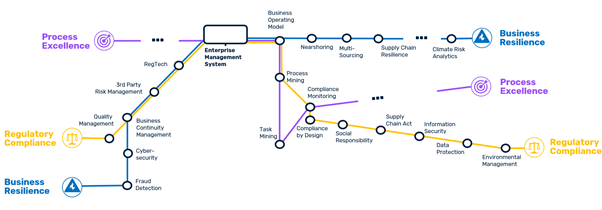Business resilience remains paramount
Learn how operational excellence plus risk and compliance process management helps your company achieve the resilience needed in these turbulent times.

Business resilience has become of paramount importance for many companies and industries: Regulatory compliance and operational excellence initiatives can help.
From the Covid-19 pandemic causing volatility in customer demand, to major disruptions of production, distribution and supplier networks and hacker attacks, it has become all too obvious just how vulnerable their business models and processes are.
Climate change is also rearing its ugly head and creating massive challenges for companies to adapt their production methods – and often even their entire business models.
Resilience means so much more today than it did even two years ago. But it goes beyond pure business continuity; today it means being able to react agilely and flexibly to rapidly changing situations. Resilient companies very often emerge stronger from crises, as they manage to increase their market share or even define new markets.
Regulatory compliance and operational excellence
In an increasingly complex world, guidelines, laws, regulations and standards are supposed to provide stability. And regulatory pressure on companies to know and comply with all relevant laws, policies and regulations is increasing.
Regulatory compliance and process excellence initiatives can make a big contribution to resilience.

Well-known risk and compliance management frameworks include quality management (ISO 9001), business continuity management (ISO 22301), information security, data protection (ISO/IEC 2700x, GDPR), and environmental management / ESG (ISO 14001).
There are also a lot of industry-specific quality and compliance challenges in industries from finance, energy, telecommunications and pharmaceuticals to life sciences. And the next regulations are just around the corner. For example, in Germany the supply chain act (Lieferkettengesetz) ensures human rights protection across all levels of your supply chain.
It’s not helpful to see the growing number of legal and compliance obligations just as a burden or cost. It makes much more sense to identify what benefits can arise in terms of business resilience and competitiveness.
Benefits arising from business resilience
Here are some examples:
- Operational risk management. By certifying your business continuity processes as per ISO 22301 you align your business processes with your operational risk management and ensure that you are properly prepared even for worst case scenarios.
- Managing quality according to ISO 9000. This ensures that you consistently meet your customers’ requirements, and that quality is consistently improved. Well-managed quality is a prerequisite for expanding business into new and global markets.
- Differentiation through sustainability. This holds enormous market potential for future generations. An environmental management system increases your legal certainty and reduces your liability risk; many organizations also see this as a prerequisite for cooperation and partnerships.
Process excellence plays a major role in almost all aspects of regulatory compliance: A good understanding of your corporate structures and assets (processes, IT systems, responsibilities, data) is a basic prerequisite for the majority of compliance aspects.
Recommendations
The following recommendations can help you to meet increasing regulatory pressures on the one hand and take advantage of the benefits in terms of business resilience on the other:
- Bundle organizational responsibility at one organizational point to have an overall view of all relevant requirements and compliance frameworks.
- Understand the link between the compliance requirements and the core processes of your company: Use your process map as a GPS system for navigating through all compliance aspects.
- Know your processes beyond the company’s boundaries, i.e. understand your complete ecosystem including suppliers and distribution networks.
- Do not build a separate management system for each compliance framework, but an integrated management system that contains the essential company assets (processes, data, responsibilities, etc.) only once and reusable.
- Use monitoring and process mining functionalities to detect deviations from the target state promptly and automatically to derive countermeasures.
- Make all policies and compliance-relevant information easily accessible in the organization by a digital handbook or process portal and actively involve all relevant stakeholders.
- Understand the management system as a living system.
You can read the original article on OPEX.
And check out our webinar: Must-know Trends for Operational Excellence in 2022 by clicking below.